|
|
 |
|
Calanoida ( Order ) |
|
|
|
Calanoidea ( Superfamily ) |
|
|
|
Paracalanidae ( Family ) |
|
|
|
Acrocalanus ( Genus ) |
|
|
| |
Acrocalanus monachus Giesbrecht, 1888 (F,M) | |
| | | | | | | Ref.: | | | Giesbrecht, 1892 (p.171, 175, 770, figs.F); Giesbrecht & Schmeil, 1898 (p.25, Rem. F); Thompson & Scott, 1903 (p.233, 243); Wolfenden, 1905 (1906) (p.1002, figs.); A. Scott, 1909 (p.30, Rem.); Sewell, 1912 (p.353, 359); 1929 (p.83); Farran, 1936 a (p.81); Mori, 1937 (1964) (p.32, figs.F); Sewell, 1947 (p.53); C.B. Wilson, 1950 (p.158, fig.F); Grice, 1962 (p.187, figs.F, Rem.); Kasturirangan, 1963 (p.24, fig.F); Chen & Zhang, 1974 (p.106, figs.F,M); Greenwood, 1976 (p.19); Zheng & al., 1982 (p.29, figs.F); Hiromi, 1987 (p.154); Bradford-Grieve, 1994 (p.51, figs.F); Chihara & Murano, 1997 (p.846, Pl.136: F,M); Bradford-Grieve, 1999 (p.877, 909, figs.F); Conway & al., 2003 (p.156, figs.F,M, Rem.); Phukham, 2008 (p.118, figs.F) | 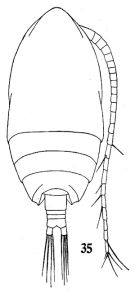 issued from : Q.-c. Chen & S.-c. Zhang in Studia Marina Sinica, 1974, 9. [Pl.3, Fig.35]. Female (from South China Sea): 35, habitus (dorsal).
|
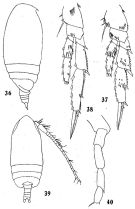 issued from : Q.-c. Chen & S.-z. Zhang in Studia Marina Sinica, 1974, 9. [Pl.4, Fig.36-40]. Female: 36, habitus (lateral right side); 37, P3; 38, P4. Male: 39, habitus (dorsal); 40, P5.
|
 issued from : T. Mori in The pelagic Copepoda from the neighbouring waters of Japan, 1937 (1964). [Pl.12, Fig.10]. Female: 10, habitus (lateral).
|
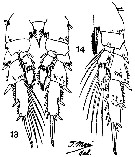 issued from : T. Mori inThe pelagic Copepoda from the neighbouring waters of Japan, 1937 (1964). [Pl.13, Figs.13-14]. Female: 13, P2 (posterior); 14, P3 (posterior).
|
 issued from : Z. Zheng, S. Li, S.J. Li & B. Chen inMarine planktonic copepods in Chinese waers. Shanghai Sc. Techn. Press, 1982 [p.29, Fig.16]. Female: a-b, habitus (dorsal and lateral, respectively); c, P3; d, P4. Scale bars in mm.
|
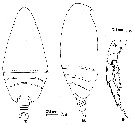 issued from : G.D. Grice in Fish. Bull. Fish and Wildl. Ser., 1962, 61. [p.186, Pl.6, Figs.7-9]. Female (from equatorial Pacific): 7-8, habitus (dorsal and lateral, respectively); 9, P4 (posterior). Nota: The truncate appearance of this species in lateral view distinguishes it from others in the genus.
|
 Issued from : W. Giesbrecht in Systematik und Faunistik der Pelagischen Copepoden des Golfes von Neapel und der angrenzenden Meeres-Abschnitte. - Fauna Flora Golf. Neapel, 1892, 19 , Atlas von 54 Tafeln. [Taf. 10, 38]. Female: exopodite of P4.
|
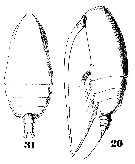 Issued from : W. Giesbrecht in Systematik und Faunistik der Pelagischen Copepoden des Golfes von Neapel und der angrenzenden Meeres-Abschnitte. – Fauna Flora Golf. Neapel, 1892, 19 , Atlas von 54 Tafeln. [Taf. 6, Figs.26, 31. Female: 26, habitus (lateral); 31, same (dorsal).
|
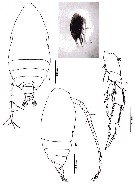 issued from : N. Phukham in Species diversity of calanoid copepods in Thai waters, Andaman Sea (Master of Science, Univ. Bangkok). 2008. [p.201, Fig.75]. Female (from W Malay Peninsula): a-b, habitus (dorsal and lateral, respectively); c, P4. Body length after the drawing: F = 0.849 mm (urosome probably curved).
| | | | | Compl. Ref.: | | | Wilson, 1942 a (p.170); Sewell, 1948 (p.391, 395, 407, 412, 433, 437); Krishnaswamy, 1953 (p.115); Chiba & al., 1957 (p.306); 1957 a (p.11); Ganapati & Shanthakumari, 1962 (p.7, 15); Fagetti, 1962 (p.14); De Decker, 1964 (p.14, 17, 27); De Decker & Mombeck, 1964 (p.11); Grice & Hulsemann, 1967 (p.14); Fleminger, 1967 a (tabl.1); Vinogradov, 1968 (1970) (p.78); Timonin, 1971 (p.281, trophic group); Heinrich, 1973 (p.95); Carter, 1977 (1978) (p.35); Dessier, 1983 (p.89, Tableau 1, Rem., %); Guangshan & Honglin, 1984 (p.118, tab.); De Decker, 1984 (p.315, 329: chart); Binet, 1984 (tab.3); Brinton & al., 1986 (p.228, Table 1); Madhupratap & Haridas, 1986 (p.105, tab.1); Dessier, 1988 (tabl.1); Hernandez-Trujillo, 1989 a (tab.1); Mitra & al., 1990 (fig.3); Yoo, 1991 (tab.1); Hernandez-Trujillo, 1991 (1993) (tab.I); Shih & Young, 1995 (p.71); Suarez-Morales & Gasca, 1998 a (p.110); Wong & al, 1998 (tab.2); Noda & al., 1998 (p.55, Table 3, occurrence); Lavaniegos & Gonzalez-Navarro, 1999 (p.239, Appx.1); Lo & al., 2001 (1139, tab.I); Dalal & Goswami, 2001 (p.22, fig.2); Uysal & al., 2002 (p.17, tab.1); Hwang & al., 2003 (p.193, tab.2); Shimode & Shirayama, 2004 (tab.2); Hsiao & al., 2004 (p.326, tab.1); Rezai & al., 2004 (p.489, tab.2); Chang & Fang, 2004 (p.456, tab.1); Lan & al., 2004 (p.332, tab.1, tab.2); Lo & al. *, 2004 (p.218, tab.1, fig.6); Gallienne & al., 2004 (p.5, tab.3); Lo & al., 2004 (p.89, tab.1); Kazmi, 2004 (p.230); Hwang & al., 2006 (p.943, tabl. I); Prusova & Smith, 2005 (p.75); Hwang & al., 2007 (p.24); Dur & al., 2007 (p.197, Table IV); Jitlang & al., 2008 (p.65, Table 1); McKinnon & al., 2008 (p.844: Tab.1); Selifonova & al., 2008 (p.305, Tabl. 2); Ayon & al., 2008 (p.238, Table 4: Peruvian samples); Fernandes, 2008 (p.465, Tabl.2); Lan Y.C. & al., 2008 (p.61, Table 1, % vs stations); Tseng L.-C. & al., 2008 (p.153, Table 2, fig.5, occurrence vs geographic distribution, indicator species); Tseng & al., 2008 (p.402, Table 2); C.-Y. Lee & al., 2009 (p.151, Tab.2); Tseng & al., 2009 (p.327, fig.5, feeding); Lan Y.-C. & al., 2009 (p.1, Table 2, % vs hydrogaphic conditions); Hernandez-Trujillo & al., 2010 (p.913, Table 2); Cornils & al., 2010 (p.2076, Table 3); Fazeli & al., 2010 (p.153, Table 1,as monochus); Schnack-Schiel & al., 2010 (p.2064, Table 2: E Atlantic subtropical/tropical); W.-B. Chang & al., 2010 (p.735, Table 2, abundance); Hsiao S.H. & al., 2011 (p.475, Appendix I); Hsiao & al., 2011 (p.317, Table 2, indicator of seasonal change); Kâ & Hwang, 2011 (p.155, Table 3: occurrence %); Tseng L.-C. & al., 2011 (p.47, Table 2, occurrences vs mesh sizes); Selifonova, 2011 a (p.77, Table 1, alien species in Black Sea); Tutasi & al., 2011 (p.791, Table 2, abundance distribution vs La Niña event); Jang M.-C & al., 2012 (p.37, abundance and seasonal distribution); Tseng & al., 2012 (p.621, Table 3: abundance); Cornils & Blanco-Bercial, 2013 (p.861, Table 1, molecular analysis, figs.3, 4, 5); in CalCOFI regional list (MDO, Nov. 2013; M. Ohman, pers. comm.); Tseng & al., 2013 (p.507, seasonal abundance); Jagadeesan & al., 2013 (p.27, Table 3, seasonal abundance); Hwang & al., 2014 (p.43, Appendix A: seasonal abundance); Jerez-Guerrero & al., 2017 (p.1046, Table 1: temporal occurrence); Palomares-Garcia & al., 2018 (p.178, Table 1: occurrence) | | | | NZ: | 14 | | |
|
Distribution map of Acrocalanus monachus by geographical zones
|
| | | | | | | | | | | | | Loc: | | | South Africa (E & W), Medit. (NW Lebanon Basin) (in Uysal & al., 2002), W Black Sea, Red Sea, Gulf of Oman, Arabian Sea, Maldives Is., Madagascar, Rodrigues Is. - Seychelles, Mascarene Basin, G. of Mannar, Palk Bay, Sri Lanka (Pearl Banks), Natal, Indian, India (W, Madras, Lawson's Bay, Mandarmani), G. of Bengal, S Burma, W Malay Peninsula (Andaman Sea), Straits of Malacca, Indonesia-Malaysia, SW Celebes, Philippines, Viet-Nam (Cauda Bay), China Seas (Yellow Sea, East China Sea, South China Sea), Taiwan Strait, Taiwan (S, E, SW, Kaohsiung Harbor, NW, N, Mienhua Canyon, NE), Korea Strait, Japan, Kuchinoerabu Is., Hokkaido, off SE Japan, Bikini, Pacif. (equatorial), Australia (Great Barrier, Moreton Bay, Shark Bay, North West Cape), New Caledonia, Fidji Is., N Marquises Is., Hawaii, California, Baja California (Bahia Magdalena, La Paz), G of California, Tahiti, off NE Tuamotu, Bahia Cupica (Colombia), Galapagos-Ecuador, off Peru, Chile
Data from Cornils & Blanco-Bercial (2013): 17°11'S; 150°25'W. | | | | N: | 110 | | | | Lg.: | | | (34) F: 0,96-0,92; (47) F: 0,92; (91) F: 1-0,9; (101) F: 1,1-1; (338) F: 1,03-0,88; M: 0,88-0,79; (786) F: 1,08-0,99; (795) F: 0,92-0,91; (991) F: 0,9-1,1; (1023) F: 1,01; (1047) F: 0,90; {F: 0,88-1,10; M: 0,79-0,88} | | | | Rem.: | The presence of this species in the Levantin Basin (reported, to my knowledge, for the first time by Uysal & al., 2002) may be a result of introduction from the Red Sea (Lessepsian migration).
Timonin (1971, p.282) considers the trophic interrelations in the equatorial and tropical Indian Ocean, and divides the plankters into 6 trophic groups from the litterature and the results of studies of mouth-parts structure and intestine content. This species is a fine-filter feeder.
See in DVP Conway & al., 2003 (version 1)
R. Stephen: Data sheets of NIO, Kochi, India (on line). | | | Last update : 16/12/2021 | |
|
|
 Any use of this site for a publication will be mentioned with the following reference : Any use of this site for a publication will be mentioned with the following reference :
Razouls C., Desreumaux N., Kouwenberg J. and de Bovée F., 2005-2026. - Biodiversity of Marine Planktonic Copepods (morphology, geographical distribution and biological data). Sorbonne University, CNRS. Available at http://copepodes.obs-banyuls.fr/en [Accessed February 03, 2026] © copyright 2005-2026 Sorbonne University, CNRS
|
|
 |
 |












